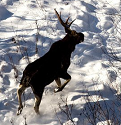 A three-man field crew flies in a helicopter above the woods near Moosehead Lake, the pilot getting as close to the treetops as he can. Once a moose is spotted, the crew’s “muggers” leap from the helicopter and wrestle the animal to the ground. They belt the moose’s legs, take blood and fecal samples and place a radio collar on it.
A three-man field crew flies in a helicopter above the woods near Moosehead Lake, the pilot getting as close to the treetops as he can. Once a moose is spotted, the crew’s “muggers” leap from the helicopter and wrestle the animal to the ground. They belt the moose’s legs, take blood and fecal samples and place a radio collar on it.
“In about 10 minutes we can get a moose sorted,” said veteran moose handler Sam Davison of Native Range Capture Services, a Nevada-based company contracted by Maine wildlife biologists to assist in what has emerged as the foremost study on moose survival in the Northeast.
Data from the radio-collar study, now entering its third year, is critical as biologists try to understand conditions that lead to winter-tick infestations among the state’s herd – and in what situations moose can gain the upper hand.
Winter ticks have taken a toll in recent years on moose from Maine to Alberta in Canada. In New Hampshire, which is partnering with Maine on the five-year study, the moose herd has dropped to 4,000 – a decline from 7,000 in the late ’90s.
Officials estimate Maine’s moose population at 60,000 to 70,000. That’s more than any other state in the contiguous U.S., but down from an estimated 75,000 in 2012. Concern about mortality caused by winter ticks was a chief reason that Maine reduced its moose-hunting permits by 25 percent in 2014 and by another 9 percent last year. The preliminary recommendation for 2016 hunting permits will be announced in two weeks.
The radio-collar study has been expanded this winter from the Jackman/Greenville area to Aroostook County, where the aerial-capture team recently collared 70 adult female and calf moose. Last week the team was near Moosehead Lake, where it intended to capture an additional 36 calves. All told, biologists from the Department of Inland Fisheries and Wildlife will be able to monitor 150 moose in the two study areas. In New Hampshire, another 90 moose have been collared to date near Errol, to the southwest of Greenville.
Biologists say they have yet to fully understand the impact that climate – or even the size of the moose herd – has on winter ticks. Lee Kantar, Maine’s moose biologist, said there is now some thought that smaller moose herds result in fewer cases of winter-tick infestation.
“There is evidence if you decrease the moose population, the less parasites you’ll have. But where is that sweet spot?” said Kantar. Continue reading at PPH – Gabe Souza/Staff Photographer from PPH – http://www.pressherald.com/2016/01/10/radio-collar-study-vital-in-understanding-moose-habits/
